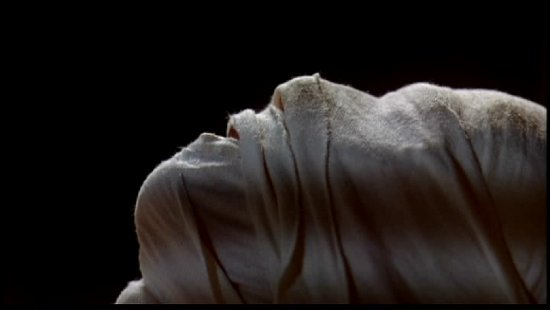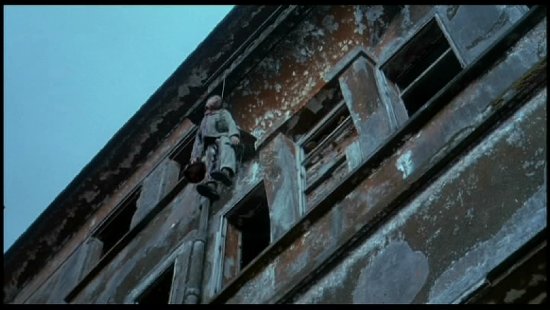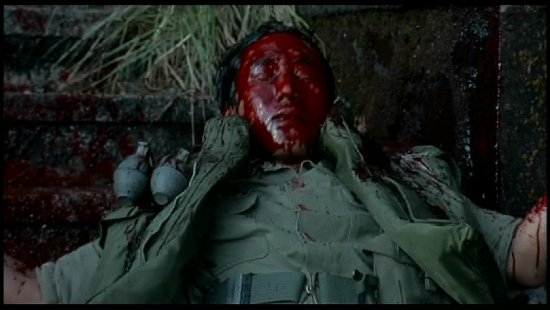Review for Ghosts of War
Ghosts of War
2006; Dir: Kong Su-Chang
(Aka: R-Point)
Film
War and Horror are two odd bed-fellows, rarely pared together thematically in cinematic excursions, despite both genres being utterly common place. While the seriousness nature of the former, and the potential outlandishness of the latter would suggest it's best kept that way, the few notable ventures into a sinister amalgamation have proven that to not necessarily be the case.
Shock Waves (1977) is a typically spooky example of the potential the crossover holds, but rarely explored. A somewhat gentle old pot-boiler, it's reliance on creepiness is something unlikely to be resurrected in today's climate. More recently, Dead Snow offered a campy, exciting measure of gore, in a similar vein to it's predecessor. This Nazi-Zombie sub-genre though is a far cry from more serious efforts to indulge in the subject, and firmly belongs in the same Grindhouse camp as the sublime Planet Terror, by director Robert Rodriquez.
With Jacob's Ladder (1990), Adrian Lyne broached the subject of horror and war very seriously, but did so by bringing the terrifying hold war has over a man. The compelling plot had Vietnam veteran Tim Robbins return home to discover he was haunted by hallucinations and terrifying supernatural incidents.
Ghosts of War though, possesses a more appropriate ancestor, in Michael Mann's The Keep. Dating back to 1983, this little-seen chiller trapped Nazi soldiers in a haunted Citadel. Being tormented by an evil presence. Accomplished and oozing with atmosphere, it's a work that has unfortunately found itself buried in obscurity in recent times. Recent British psychological horror Deathwatch (2002) is an even more direct relative, though that film achieved little, with even less subtlety, despite some very notable, forceful imagery. In many ways however, the underrated Sci-Fi terror in space of Event Horizon (1997) offers an almost identical plot to Ghosts of War, albeit with a different pay-off, and reasoning behind the horror. In any case, the last decade or has given rise to numerous crossovers between war and horror, including but not limited to, Outpost, The Bunker, and 2002 entry, Below.
Director Su-Chang's story places a platoon of soldiers in a forbidden sector of Vietnam. Having received mysterious transmissions from a previous platoon that went AWOL six months prior, the South Korean military are determined to find out the truth. They're seemingly more aware of the dangers than the majority of the men sent however, as it becomes clear that something is haunting the area… R-Point. As the mysterious film unravels, we learn more about the history of the place, and the soldiers are plunged into a terrifying ordeal.
Preoccupied with implicating the viewer in the confusion, resulted in me finding Ghosts of War hard to relate to. At no point did I really care for the characters, or feel empathy for their predicament. Part of the issue is with the flimsy characters involved. Lieutenant Choi is a compelling enough lead, coolly, calmly navigating the plot with a stern expression. However his placid, restrained demeanour is swamped by the bland grunts that surround him right down to panic-stricken youngster who's his own worst enemy. In fact, too many of the cast are reduced to shrieking and spending the film shivering. Aren't these guys supposed to troops in Vietnam?
That said, if the filmmakers intended to replicate the baffled, stumbling behaviour of the troops within the heads of the audience, they succeeded, as the picture is a disorientating experience. It gains momentum too, towards the end, as one or two character's are afforded the opportunity to shine, stepping out from under their helmets a little more. The change is significant too, occurring in the final act, just as the film appears destined to fizzle out similarly to a overextended Twilight Zone episode. The violence is shocking in one or two instances, but restrained for the most part. However, the dreamlike qualities do not require any more than that.
Where it really succeeds is in it's grim atmosphere, and foreboding sense of dread. The stellar soundtrack contributes immeasurably to this, and is probably the film's biggest achievement. In a few brief moments, the grating, oppressive drone of the soundtrack approaches the guttural, heavy breathing tones incorporated masterfully in Dario Argento's Suspiria. At time, during scenes set at night, this almost achieves a gothic horror sensibility. The lack of a central bogeyman, or one particular threat from which the horror generates, further adds to the nauseating, suffocating sense of horror surrounding the soldiers.
Bordering on the surreal, this is certainly an obscure, at times, understated horror tale. Not a classic by any means, nor one of the better Korean entries from the past decade or so, it nonetheless, highly recommended purely due to it being different.
Audio and Visual
The review copy offered was a DVD-R ,therefore limiting the judgement by which I can pass on the finished product. That said, if they quality of the version I saw is anything to go by, I fully expect the released version to be a crisp and clear. Likewise with the fine 5:1 Korean audio track.
Extras
-The Making of R-Point
A half hour making of documentary that lacks somewhat in structure, occasionally lapsing into random behind the scenes footage. Regardless, it's pretty interesting stuff, especially the snippets involving the actors discussing their characters' backgrounds.
-R-Point Radio
A look at the sound recording which is one of the film's crucial plot points, and how it was achieved. This is a solid attempt to focus on one of the lesser appreciated aspects of genre work.
- 1972, Vietnam
A look at the authenticity of the equipment and treatment of the war aspect of the film, this could have been a lot more comprehensive. At just under ten minutes though, it's still a worthwhile little feature.
-Special Effects Featurette
Oddly, this feels completely unnecessary, as the material here is replicated in parts in the main making of feature. Some of that footage would have been better placed here, to make it more thorough, while the look at Vietnam, or the Radio piece could easily have been slotted into the main feature. The make-up artist discussing his work here is a great, talkative subject however.
-Commentary
Worth a listen, the films' director Kong Su-Chang is a lively host, alongside producer Choi Kang-Hyuk, and location supervisor, Kim Wan-Shik.
-Original Trailer
Conclusion
Already, Ghosts of War has prematurely dated, and in various respects, lacks a certain panache. The scares are admittedly, repetitive, and the occasionally the filmmakers appear to have fallen asleep at the wheel. This results in the film losing it's identity briefly, before arriving at a rather better conclusion than expected.
Whereas a Deathwatch strong point was perhaps it's gritty tone, removed of that facet, this Korean picture instead relies on an almost Fulci-esque dreaminess. That said, it's vastly superior to the majority of it's kind, and exhibit's a commitment that no amount of roughness around the edges can diminish. R-Point, or Ghosts of War (which is by no means a better title) is a classy, sinister nightmare of a picture.
Combined with a surprisingly decent collective of Extras, and at a budget price, those looking for something different would be far worse served then taking a chance on Ghost of War.



Your Opinions and Comments
Be the first to post a comment!